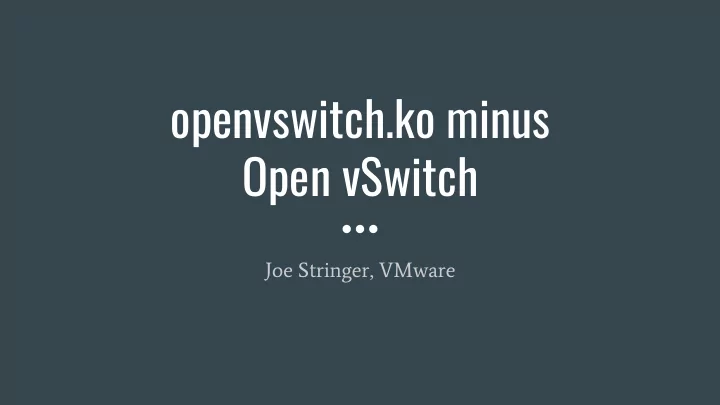

openvswitch.ko minus Open vSwitch Joe Stringer, VMware
http://garfieldminusgarfield.net/post/26843739 2
Software-Defined Networking 3
Flows Classify a set of packets that have some common criteria ● Not all flows are created equal ● ● Granularity => Power => Performance? ○ If possible, one lookup ● 4
How we described flow-based policy in Linux Generic Netlink Families ● Shared flow table resource (datapath) ● ○ Need a bounding box for which set of flows apply Associate rx/tx ports ● Define the flow ● ○ Packet fields, metadata that can be matched on Describe how to handle packets when flow table empty ● 5
Datapath family datapath0 datapathN Flow Flow Table Table datapath0 datapathN # ovs-dpctl add-dp datapath0 6
Virtual port (vport) family datapath0 Flow Table vport vport tunnel internal netdev device # ovs-dpctl add-if datapath0 <netdev> 7
Flow family Flow datapath in_port(p0), match+actions } eth(), eth_type(0x0806), Flow arp() Table output(p1) Flow mask Masks Flow identifier p0 p1 pN # ovs-dpctl add-flow datapath0 “in_port(0),eth(),eth_type(0x0806),arp()”, 1 8
Flow family: lookup hit 1 Flow Key Table in_port(p0), 2 eth(src=01:23:45:67:89:f0, dst=ff:ff:ff:ff:ff:ff), Matching flow -> actions eth_type(0x0806), arp(sip=192.168.0.1, tip=192.168.0.2,op=1,...), 9
Masked tuple matching (megaflow) eth(src=x,dst=y),ip(dst=1.2.3.0) eth(src=x,dst=y),ip(dst=1.2.3.1) } eth(src=x,dst=y),ip(dst=1.2.3.2) eth(src=x,dst=y),ip(dst=1.2.3.3) eth(src=x/ff:ff:ff:ff:ff:ff,dst=y/ff:ff:ff:ff:ff:ff), ip(dst=1.2.3.0/255.255.255.248) eth(src=x,dst=y),ip(dst=1.2.3.4) eth(src=x,dst=y),ip(dst=1.2.3.5) eth(src=x,dst=y),ip(dst=1.2.3.6) eth(src=x,dst=y),ip(dst=1.2.3.7) 10
Flow family: lookup hit (megaflow) 1 Flow Unmasked key Table in_port(p0), 3 eth(src=01:23:45:67:89:f0, dst=ff:ff:ff:ff:ff:ff), Matching flow -> actions Masked key eth_type(0x0806), arp(sip=192.168.0.1, tip=192.168.0.2,op=1,...), 2 Mask list 11
Flow family: Lookup miss * netlink socket 1 2 3 Key Upcall Flow in_port(1), packet Table eth(), metadata eth_type(0x1234) * netlink socket may be set to ‘0’, indicating default drop 12
Packet family: userspace upcall SDN control User Kernel Flow Downcall Upcall flow key packet mask packet metadata actions metadata actions ufid 13
Packet family: Execute User Kernel Downcall modified packet packet metadata actions 14
OVS Netlink API Summary Datapath family ● Shared flow table ○ Access to stack ○ Place to hang ports ○ Virtual port (vport) family ● Access for rx/tx with the datapath ○ ● Flow family Describe forwarding behavior ○ Packet family ● ○ Handle packet+metadata to/from userspace 15
Notable Megaflows ● Improvements ● Traffic Isolation NetFilter integration ● Recirculation ● 16
Megaflows Optimizations Ktps Flows Masks CPU % (TCP_CRR) (user / kernel) Megaflows disabled 37 1,051,884 1 45 / 40 No optimizations 56 905,758 3 37 / 40 With priority sorting 57 785,124 4 39 / 45 With prefix tracking 95 13 10 0 / 15 With staged lookup 115 14 13 0 / 15 All optimizations 117 15 14 0 / 20 From “The Design and Implementation of OVS”, Ben Pfaff et al., NSDI ’15 17
Notable improvements: Upcall hashing netlink netlink netlink socket socket socket Virtual port 18
Notable improvements: conntrack 2 actions 1 ct() ... NetFilter Flow Table 19
Notable improvements: recirculate 2 actions 1 ct() recirc(0x1) NetFilter Flow 3 Table 20
CLI tools ● openvswitch.ko Open vSwitch (ovs-vswitchd) ● MidoNet ● ● Weave Net Kernel API users Indigo Virtual Switch ● 21
CLI tools - datapath / vport # modprobe openvswitch # ovs-dpctl show # ovs-dpctl add-dp myDP system@myDP: # ip li add dev dummy0 type dummy lookups: hit:0 missed:177 lost:177 # ovs-dpctl add-if myDP dummy0 flows: 0 # ip li add dev dummy1 type dummy masks: hit:0 total:0 hit/pkt:0.00 # ovs-dpctl add-if myDP dummy1 port 0: myDP (internal) port 1: dummy0 port 2: dummy1 22
CLI tools - flow # ovs-dpctl add-flow "in_port(1),eth(),eth_type(0x806),arp()" 2 # ovs-dpctl add-flow "in_port(2),eth(),eth_type(0x806),arp()" 1 # ovs-dpctl add-flow "in_port(1),eth(),eth_type(0x800),ipv4(proto=1),icmp()" 2 # ovs-dpctl add-flow "in_port(2),eth(),eth_type(0x800),ipv4(proto=1),icmp()" 1 # ovs-dpctl dump-flows in_port(2),eth_type(0x0806), packets:0, bytes:0, used:never, actions:1 in_port(1),eth_type(0x0806), packets:0, bytes:0, used:never, actions:2 in_port(2),eth_type(0x0800),ipv4(proto=1), packets:0, bytes:0, used:never, actions:1 in_port(1),eth_type(0x0800),ipv4(proto=1), packets:0, bytes:0, used:never, actions:2 23
Open vSwitch Daemon http://openvswitch.org/assets/featured-image.jpg 24
MidoNet https://www.midonet.org/i/graphic.png 25
Weave Net https://www.weave.works/wp-content/uploads/d989f137a913d15c6ab2afe14149d8acfd180db3.png 26
Indigo Virtual Switch http://www.bigswitch.com/sites/default/files/_/switch_light_archictecture.png 27
Common threads: integration Lightweight Tunneling ● Netfilter ● ● XFRM QoS ● Hardware offloads ● 28
Common threads: complexity Desired configuration is orders of magnitude more complex than kernel API ● Dozens of tables ○ Thousands of priorities ○ Compile hundreds of lookups into a single* lookup ● ○ Lower per-packet costs for complex pipelines * or small integer when subsystem input is required 29
Summary SDN has driven openvswitch.ko development ● logically centralized packet forwarding behaviour ○ OVS Netlink API provides generally useful primitives ● Variety of users ● OVS, MidoNet, WeaveNet, IVS ○ Allows userspace to integrate with other kernel functionality ● Minimize kernel code complexity ● 30
http://garfieldminusgarfield.net/post/37998316 31
fin joe@ovn.org
Recommend
More recommend